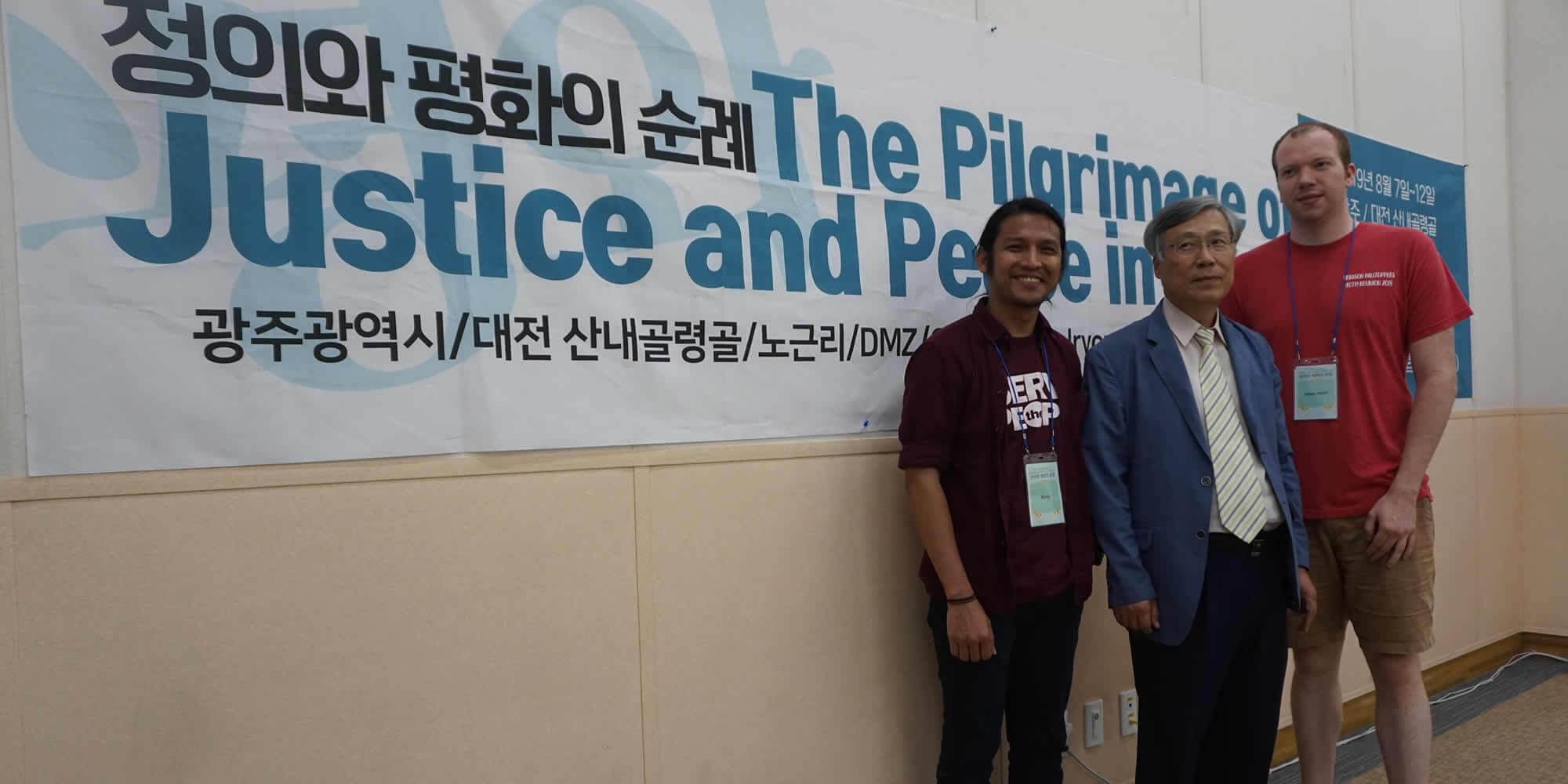
Adam Shaw (right) with Dr. Chung Koodo (center), Chairman of the No Gun Ri International Peace Foundation, and missionary Bong Dalisay (left), at the 2019 Pilgrimage of Justice and Peace hosted last August by the Ecumenical Youth Council in Korea (EYCK) in partnership with the WCC.
PHOTO: COURTESY ADAM SHAW
By Christie R. House
September 2020 | ATLANTA
I grew up seeing people like my father holding communal memorial services at places as near to North Korea as they could get. Dividing Korea at the 38th parallel not only divided the land but also loved ones.
– Rev. James Chongho Kim, from “The Light of Peace:
Churches in Solidarity with the Korean Peninsula,” World Council of Churches
This year marks the 70th anniversary of the start of the Korean War. The conflict has not officially ended because a peace treaty was never signed between North Korea and the United States. An armistice was signed in 1953, which brought about a ceasefire.
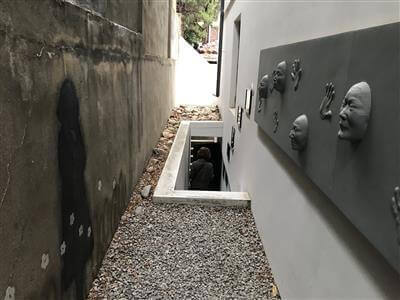
PHOTO: ADAM SHAW
The work of seeking justice, freedom and peace for all people is one of four goals that guides the work of the General Board of Global Ministries. Several Global Ministries missionaries engage in this specialized area of work.
Missionaries Adam Shaw, in Seoul, Korea, and Dr. Jin Yang Kim, in Geneva, Switzerland, work with a variety of coalitions and ecumenical networks to give voice to the desire for peace and justice on the Korean Peninsula.
Remembering the Korean War
My father’s pain still lives in me. There were ten million families separated after the Korean War.
– Rev. James Chongho Kim, ibid.
After the surrender of Japan at the end of World War II, the Japanese occupation of Korea, which lasted 35 years, finally ended. But in 1945, the Korean Peninsula was then divided in two at the 38th parallel. The northern half was administered by the Soviet Union, while the southern half was administered by the United States. In 1948, amid Cold War tensions, North and South became two sovereign states.
In 1950, the tensions erupted into armed conflict between North and South Korea and both sides suffered tremendous losses from 1950 to 1953. Nearly 3 million perished, the majority of whom were Korean civilians.
After the Korean Armistice Agreement was signed, a heavily patrolled Demilitarized Zone (DMZ) was established between the two countries. Today, no one crosses without several layers of permission, depending on which side requests the crossing and for what purpose.
Peace work takes an international network
What I have learned from my work with peace is that peace work should come from the bottom to the top, not from top to bottom.
– The Rev. Dr. Jin Yang Kim
The Rev. Dr. Jin Yang Kim was born in South Korea and ordained as a Presbyterian pastor there. He became a United Methodist pastor in the Northern Illinois Conference after moving to the United States to pursue advanced studies. He joined in ecumenical efforts for peace and reunification as a member of the Peace Committee in The United Methodist Church. In 2017, he was commissioned as a missionary to serve with the World Council of Churches in Geneva.
The WCC has a long history of engagement between North and South Korea. “Koreans can’t initiate meetings themselves between North and South because of the political situation, so the WCC has convened encounters between North and South Korea. That has been its main role in the peace process for more than 30 years,” noted Kim.
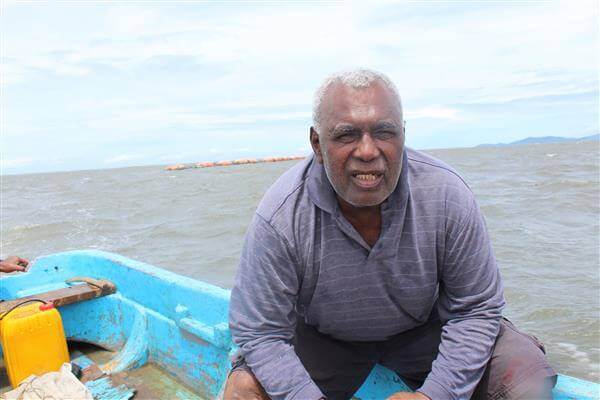
PHOTO: JIN YANG KIM
Kim works with a WCC platform created to encourage Christians around the world to gather together to promote peace on the Korean Peninsula. The platform’s official name is the Ecumenical Forum for Peace, Reunification and Cooperation on the Korean Peninsula. It is also known as the Ecumenical Forum for Korea (EFK).
“The WCC convenes this international network and we have a counterpart in North Korea, the Korean Christian Federation, and one in South Korea, the National Council of Churches in Korea. We have been communicating with both North and South, though you can’t contact the North Korean people directly. But, from time to time, we have received email or fax responses from North Korea,” said Kim.
About 50% of Kim’s work is with the EFK, and the other half is as the coordinator for the WCC’s Pilgrimage of Justice and Peace. In this role, Kim coordinates the Pilgrimage Reference Group, which meets at least once a year to choose an issue related to peace and justice. “Forming ecumenical bonds and making connections is a powerful part of solidarity,” Kim explained.
Annually, Kim organizes an ecumenical pilgrimage in which groups from member churches participate. In February, four pilgrimage teams visited four different venues in Fiji. Teams addressed the issues of rising sea levels, people displaced from their homes, the extraction of natural resources by industries, which destroys the fragile eco-system, and gender justice.
In 2019, Kim led a young people’s Pilgrimage of Justice and Peace to Pusan, Korea. Young people from around the world, including young people from the UMC and other U.S. churches, met in Korea to learn more about the Korean War and its lingering consequences.
“We need to educate young people about this situation in Korea,” Kim said. “In the United States, Christians need to raise their voices for peace. Only the U.S. Congress can make a peace agreement, and only the U.S. people can convince Congress that it needs to be done.”
Kim says that many separated family members never met again after the war broke out. “Even though the Korean War has been forgotten, let’s not forget the pain and suffering of separated families.”
Deinah Quire, a current young adult Global Mission Fellow from Liberia, working at the Border Peace School at Soi Mountain, on the DMZ, believes peace on the peninsula will take a world effort. She makes a daily trek up the mountain to prayer for peace with other members of the school staff. “During our candlelight peace prayer movement, we became more convinced of the vital role that ordinary people play. Preventing war between nations is an impossible task as individuals, but it becomes possible when many people cooperate.
Peace work takes a grassroots effort
Adam Shaw has served as a Mission Intern (a predecessor to the Global Mission Fellow program), a Mission Advocate, and a full-time missionary. He has worked in the Philippines, the California-Pacific Annual Conference and New York City. In 2019, he began a missionary assignment with Global Ministries’ Asia Pacific Regional Office in Seoul as a Peace with Justice Advocate for Korea and the Asia/Pacific region.
“I am working for peace and justice in Korea on the grassroots level. Having worked in the Philippines, I am familiar with that person-to person connection and building relationships,” Shaw explained.
With help from Bong Dalisay, a fellow missionary in the office, Shaw connected with “the Monday Night Group,” established by United Methodist and other missionaries in the 1970s. Today, this group of missionaries and mission coworkers comes from many faith denominations and focuses on the peace with justice movement in Korea.
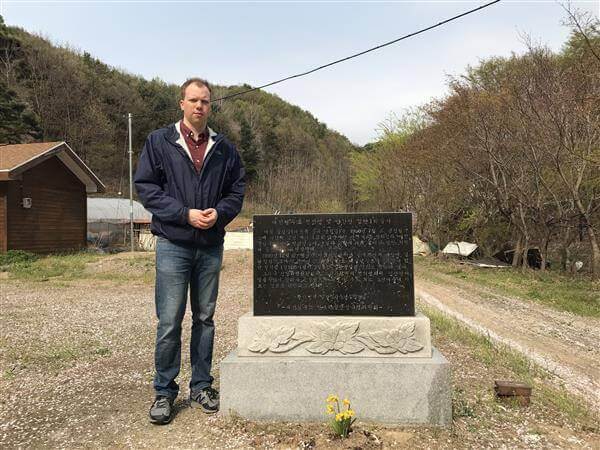
PHOTO: COURTESY ADAM SHAW
“We work with a sense that we are coming up against an immovable object, which is the United States government and U.S. public opinion,” Shaw noted.
“It seems like many issues divide the U.S., but North Korea is not one of them. People are united about North Korea being a threat to the world. It is difficult to crack that opinion. That’s where I see my role. How do I start having those conversations with people, in which we examine ourselves as a nation?”
Like Kim, Shaw’s peace with justice work in Korea makes up about 50% of his work. He also works with ecumenical groups on other peace issues, such as keeping Article 9, the clause forbidding a standing army, in the Japanese constitution.
He has worked on a project in Cambodia that aims to provide livelihood alternatives for people who have been trafficked.
But Shaw feels working for peace in a country that has been divided for 70 years is a particular calling for him. “I spend more time with the people of the younger generation,” he said, “because their voices and the voices of women are often not elevated in the discussion. The traditional push is for peace and reunification. But most people I spend time with don’t see reunification as a realistic goal. They focus on peace and reconciliation; just peace would be a great first step.”
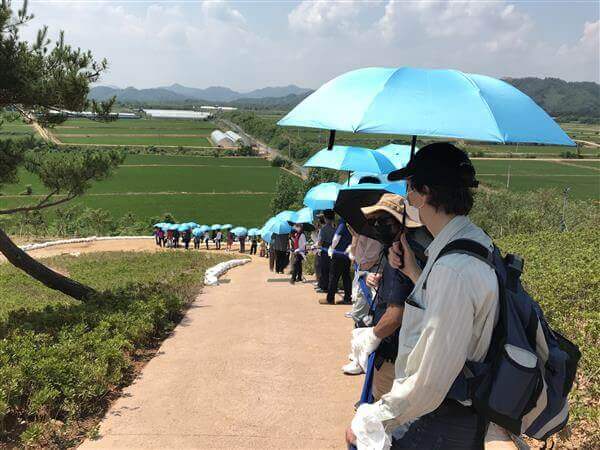
PHOTO: ADAM SHAW
Like Kim, Shaw believes one of the most helpful things United Methodists can do is to educate themselves about the situation on the Korean Peninsula.
“It’s hard to chart a new pathway into this peace and justice future if we have no idea what actually happened. I think we can’t reconcile our differences if we don’t know what transpired,” Shaw said.
The WCC has produced several resources this year to help churches understand the issues. The EFK sent out a Joint Ecumenical Peace Message in June about the 70th anniversary of the beginning of the Korean War and outlines necessary steps to secure a lasting peace on the peninsula. In addition, the WCC just published a new book, “The Light of Peace: Churches in Solidarity with the Korean Peninsula,” from which the beginning quotes of this article were taken. It contains reflections from Dr. Jin Yang Kim and Thomas Kemper, Global Ministries’ former general secretary.
Christie R. House is a consultant in writing and editing with Global Ministries.

